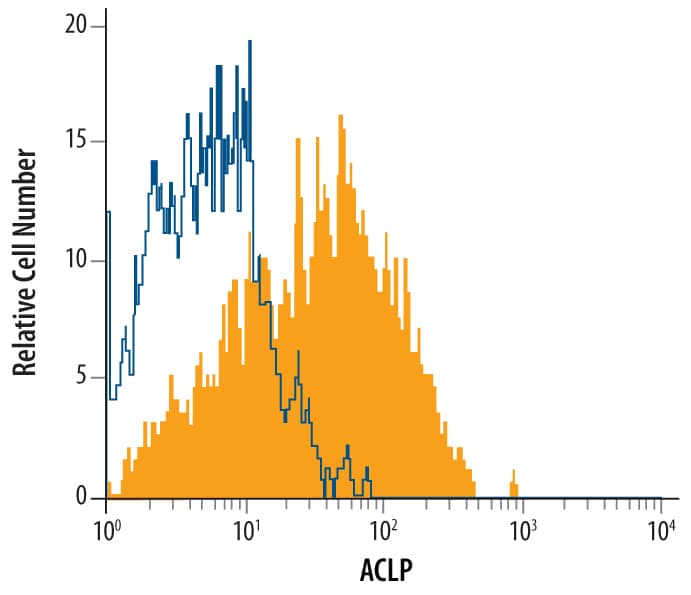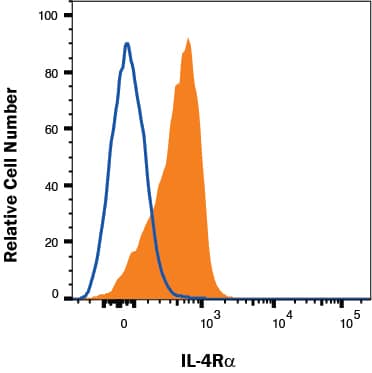Recombinant Human ACLP His-tag Protein, CF
Recombinant Human ACLP His-tag Protein, CF Summary
Product Specifications
Gln26-Phe1158, with a C-terminal 10-His tag
Analysis
Customers also Viewed
Product Datasheets
Carrier Free
CF stands for Carrier Free (CF). We typically add Bovine Serum Albumin (BSA) as a carrier protein to our recombinant proteins. Adding a carrier protein enhances protein stability, increases shelf-life, and allows the recombinant protein to be stored at a more dilute concentration. The carrier free version does not contain BSA.
In general, we advise purchasing the recombinant protein with BSA for use in cell or tissue culture, or as an ELISA standard. In contrast, the carrier free protein is recommended for applications, in which the presence of BSA could interfere.
6425-AC
| Formulation | Lyophilized from a 0.2 μm filtered solution in PBS. |
| Reconstitution | Reconstitute at 500 μg/mL in PBS. |
| Shipping | The product is shipped at ambient temperature. Upon receipt, store it immediately at the temperature recommended below. |
| Stability & Storage: | Use a manual defrost freezer and avoid repeated freeze-thaw cycles.
|
Scientific Data
 View Larger
View Larger
When Recombinant Human LRP-6 Fc Chimera (Catalog # 1505-LR) is coated at 2 µg/mL, 100 µL/well, Recombinant Human ACLP (Catalog # 6425-AC) binds with an ED50 of 1-8 µg/mL.
 View Larger
View Larger
2 μg/lane of Recombinant Human ACLP His-tag (Catalog# 6425-AC) was resolved with SDS-PAGE under reducing (R) and non-reducing (NR) conditions and visualized by Coomassie® Blue staining, showing bands at 160-180 kDa.
Background: ACLP
Aortic carboxypeptidase-like protein (ACLP), also known as adipocyte enhancer binding protein (AEBP1) (1, 2), is a secreted ECM-associated protein expressed primarily by perivascular and vascular cells and is up-regulated in activated vascular cells following vascular injury (3). Pro-ACLP is composed of an N-terminal signal sequence that is cleaved off in the mature form, a Lys/Pro rich motif (aa 47-326), a Glu rich motif (aa 1079-1136), a collagen binding discoidin-like domain (aa 383-540) and a peptidase-like domain (aa 560-942) (4, 5). Mature human ACLP shares 84% aa sequence identity with mouse and rat ACLP. In the liver, ACLP is specifically expressed in hepatic stellate cells (HSCs). Although unrelated to WNT proteins, ACLP can specifically bind to Frizzled-8 and Lrp6 to form a ternary complex to activate the canonical WNT pathway and exacerbates nonalcoholic steatohepatitis (NASH) pathology, indicating that NASH can be treated by targeting ACLP (6). Diseases associated with ACLP-1 include Ehlers-Danlos syndrome classic-like 2 (EDSCLL2) (7) and gastroschisis. Over-expression of ACLP-1 is associated with glioblastoma (8).
- He, G.P. et al.(1995) Nature. 378: 92.
- Ro, H.S. et al. (2001) Gene. 280:123.
- Layne, M.D. et al. (2002) Cir. Res. 90:728.
- Tumelty, K.E. et al. (2014) J. Biol. Chem. 289:2526.
- Layne, M.D. et al. (1998) J. Biol. Chem. 273:15654.
- Teratani, T. et al. (2018) J Clin Invest. 128:1581.
- Blackburn, P.R. et al. (2018) Am J Hum Genet. 102:696.
- Ladha, J. et al. (2012) Mol Cancer Res. 10:1039.
Citation for Recombinant Human ACLP His-tag Protein, CF
R&D Systems personnel manually curate a database that contains references using R&D Systems products. The data collected includes not only links to publications in PubMed, but also provides information about sample types, species, and experimental conditions.
1 Citation: Showing 1 - 1
-
ACLP Activates Cancer-Associated Fibroblasts and Inhibits CD8+ T-Cell Infiltration in Oral Squamous Cell Carcinoma
Authors: Sekiguchi, S;Yorozu, A;Okazaki, F;Niinuma, T;Takasawa, A;Yamamoto, E;Kitajima, H;Kubo, T;Hatanaka, Y;Nishiyama, K;Ogi, K;Dehari, H;Kondo, A;Kurose, M;Obata, K;Kakiuchi, A;Kai, M;Hirohashi, Y;Torigoe, T;Kojima, T;Osanai, M;Takano, K;Miyazaki, A;Suzuki, H;
Cancers
Species: Human
Sample Types: Whole Cells
Applications: Bioassay
FAQs
No product specific FAQs exist for this product, however you may
View all Proteins and Enzyme FAQsReviews for Recombinant Human ACLP His-tag Protein, CF
There are currently no reviews for this product. Be the first to review Recombinant Human ACLP His-tag Protein, CF and earn rewards!
Have you used Recombinant Human ACLP His-tag Protein, CF?
Submit a review and receive an Amazon gift card.
$25/€18/£15/$25CAN/¥75 Yuan/¥2500 Yen for a review with an image
$10/€7/£6/$10 CAD/¥70 Yuan/¥1110 Yen for a review without an image











